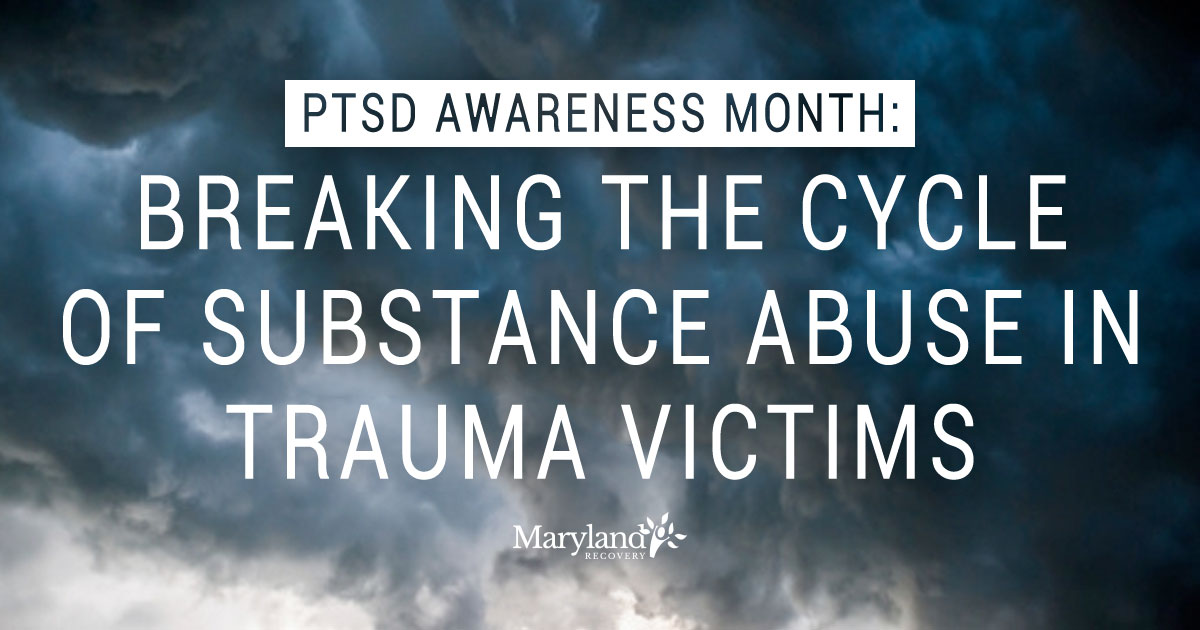 The month of June is an important time for those suffering from post-traumatic stress disorder, or PTSD. June is PTSD Awareness Month, a time for organizations to educate individuals and medical professionals on new ways to identify PTSD as well as cutting-edge treatment options.
The month of June is an important time for those suffering from post-traumatic stress disorder, or PTSD. June is PTSD Awareness Month, a time for organizations to educate individuals and medical professionals on new ways to identify PTSD as well as cutting-edge treatment options.
If there’s one thing that more organizations are trying to stress, it’s this: PTSD affects more than just vets. It’s a debilitating disease that can impact anyone with past trauma in their life. Recognizing this may just save someone from a lifetime of drug and alcohol abuse.
What Is PTSD?
Post-traumatic stress disorder is considered to be one of the most emotionally challenging mental disorders. It leads to intense anxiety, haunting memories and disturbing flashbacks that can make people feel like they are living a bad dream.
As you can imagine, these feelings make it very difficult to function in the real world. How is a person supposed to form healthy relationships, move up the career ladder and raise a family when they are constantly plagued with debilitating anxiety and nightmares?
To help themselves cope, victims of past trauma sometimes turn to drugs and alcohol. These substances help numb the pain. The trouble is that when substance abuse occurs, the individual now has two mental health disorders to combat: the PTSD and the addiction.
Who Is Affected By PTSD?
While it’s true that many war veterans do suffer from PTSD, any past trauma that leaves a person feeling helpless or hopeless can lead to this mental disorder. Examples include:
- Violent Assault
- Sexual Assault
- Childhood Abuse and/or Neglect
- Serious Injury
- Car Accident
- Plane Crash
- Being Threatened by a Weapon
- Mugging or Robbery
- Terrorist Attack
- Kidnapping
- Natural Disasters
In men, combat is the most common reason for PTSD. In women, it’s sexual assault. Individuals with PTSD are also more likely to suffer from depression, attention deficit disorder, chronic pain and chronic illnesses like diabetes, liver disease or high blood pressure.
PTSD & Addiction
 The symptoms of PTSD can be intense and cause a great deal of pain. Many individuals find that they cannot cope with their symptoms, so they turn to drugs and alcohol as a means of escape.
The symptoms of PTSD can be intense and cause a great deal of pain. Many individuals find that they cannot cope with their symptoms, so they turn to drugs and alcohol as a means of escape.
The National Comorbidity Survey reports that 52 percent of males and 28 percent of females with PTSD also suffer from alcohol abuse or dependence. Roughly 35 percent of men and 27 percent of females with PTSD also have a drug abuse problem.
What You Should Know About PTSD And Addiction
Dual Diagnosis Treatment
When an individual is suffering from both PTSD and addiction, their greatest chances for recovery exist within a dual diagnosis treatment center. These treatment programs are best equipped to handle co-occurring disorders because they address both the trauma and addiction treatment.
A strong integrated treatment program will include components such as the following:
- Individual Psychotherapy
- Counseling Sessions
- Couples Therapy/Family Counseling
- Membership In A 12-Step Group
- Medication Therapy
- Alternative Therapies
- Life Skills Coaching
Stopping The Cycle Of Abuse
It’s reassuring to know that treatment is available for those suffering with both PTSD and addiction. However, the better situation is to deal with just the PTSD. It’s far less complicated to treat one mental disorder as opposed to two, and identifying it early on can lead to a better quality of life for the individual.
In an effort to educate the general public, the month of June is dedicated to providing information surrounding PTSD, including its risk factors, diagnosis criteria and treatment options. Armed with the right information, we can hope that more people will receive care before they feel a need to turn to drugs and alcohol. This is how we stop the cycle of abuse.
Do You Or A Loved One Suffer From PTSD?
PTSD is a very debilitating mental health condition, and it’s not reserved for war veterans only. If you feel that you or someone you love could be suffering from PTSD, please reach out to a doctor or therapist as soon as possible.
If you or your loved one has been using drugs or alcohol to escape the flashbacks of past trauma, it’s possible that dual diagnosis treatment is needed. Call Maryland Recovery to learn more about our strong dual diagnosis treatment program and our approach to helping individuals with PTSD.
Reviewed by Christopher Schwartfigure MS, LGPC, CAC-AD








